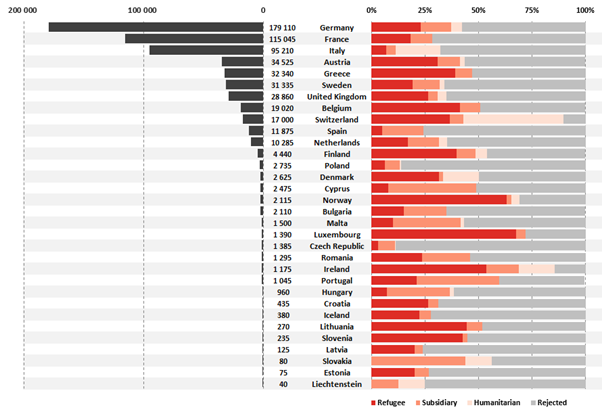With regard to the volume of first-instance decisions issued in each country, most decisions were issued in Germany (30 % of all decisions), France (19 %) and Italy (16 %) (Figure 14). Jointly, these three countries issued about two-thirds of all decisions issued in the EU+. These three countries processed the most first-instance decisions also in 2017, but the overall output was distributed differently. In fact, a year earlier Germany alone issued more than half of all decisions in the EU+. In 2018, the output of German first-instance authorities was reduced almost threefold. In contrast, France (+ 4 %) and in particular Italy (+ 22 %) issued more decisions. Therefore, the output was more evenly distributed across the EU+ in 2018. Other countries issuing fewer decisions compared to 2017, but still accounting for a considerable proportion of first-instance decisions in 2018 were Austria (- 24 %), Belgium (- 21 %), Sweden (- 49 %) and the Netherlands (- 35 %). The largest declines, nevertheless, took place in Hungary (issuing fewer than 1 000 decisions in 2018, but more than 4 000 a year earlier) and Norway (somewhat more than 2 000 decisions, down from almost 7 000 in 2017). Conversely, the volume of first-instance decisions expanded in Greece (+ 32 %) and, on a smaller scale, Ireland (+ 33 %) and Malta (+ 35 %).
For some citizenships, the majority of first-instance decisions were issued in a single EU+ country. For instance, Germany issued the majority of decisions to applicants from Syria (56 % of all decisions received by Syrians in the EU+) and Turkey (54 %), and almost half of all decisions issued to Somalis (44 %) and Iranians (43 %). France accounted for more than half of all first-instance decisions concerning applications lodged by nationals of Congo DR (70 %), Sudan (57 %) and Albania (51 %). Italy issued the vast majority of decisions to applicants from Senegal (74 %), Mali (65 %), Gambia (64 %) and Bangladesh (57 %).
Among the countries in which humanitarian protection was applicable, Italy and Switzerland were the countries that made the largest use of these national forms of protection. In fact, humanitarian protection accounted for the majority of positive decisions in Italy (65 %) and Switzerland (52 %) 122. Most EU+ countries, in contrast, granted prevalently refugee status: in particular, all decisions in Slovenia (100 %), and almost all decisions in Luxembourg (94 %) and Norway (91 %). Finally, subsidiary protection was more vastly granted in Cyprus (84 % of all positive decisions), Spain (80 %) and Slovakia (78 %).
|
Number of first-instance decisions (left) issued in 2018 and outcome (right), by EU+ country |
 |
|
Figure 14: Germany, France and Italy issued two-thirds of all decisions in the EU+ |
___
122 The share of humanitarian protection reflects reporting to Eurostat. Switzerland is not bound to Directive 2011/95/EU of the European Parliament and of the Council of 13 December 2011. Positive decisions grant either refugee status or, in cases there are reasons for refusing asylum in accordance with Articles 53 and 54 of the Asylum Act, Temporary Admission Status (TAS). TAS can be granted independently of refugee status, for other reasons which are similar to the EU subsidiary protection (Article 3 ECHR, situation of war in the country of origin) or for pure humanitarian reason (for example, serious illness). Although TAS is reported as humanitarian protection, it may also take the form of subsidiary protection.
